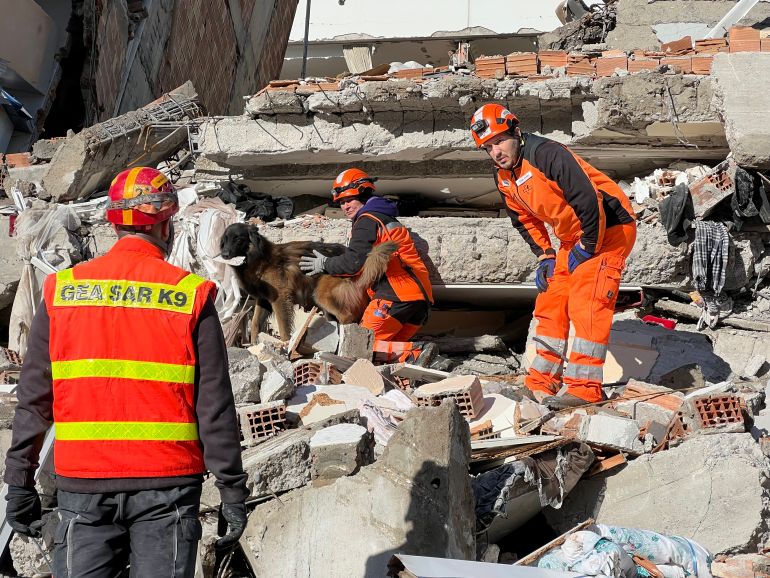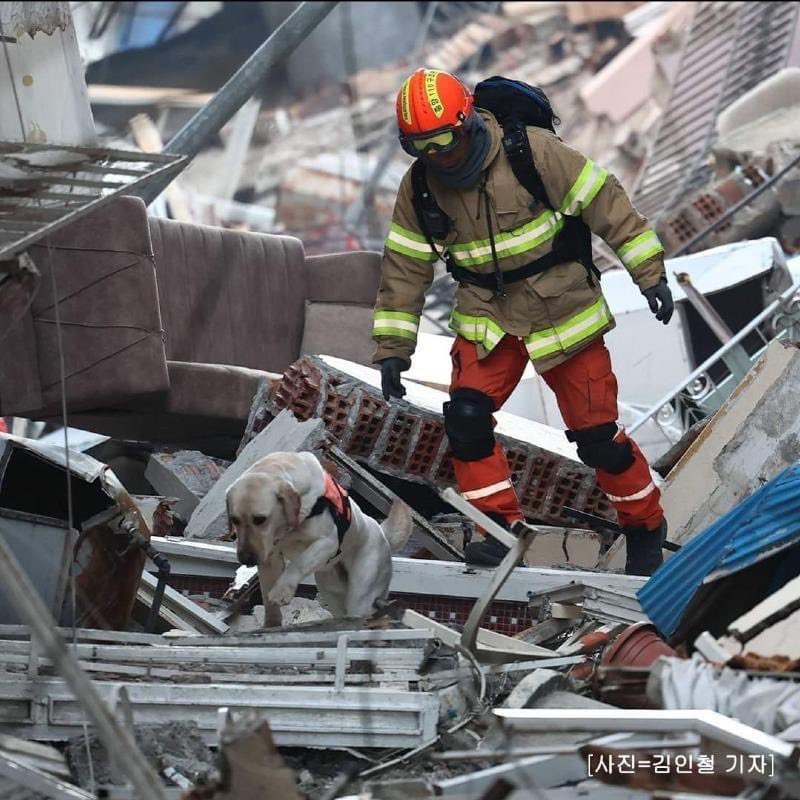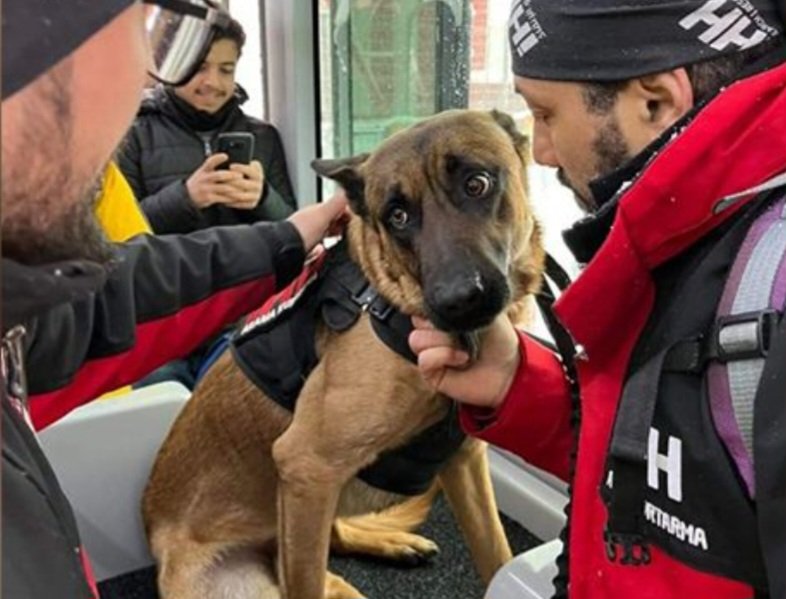![]() A rescue dog sniffs the debris of a ruined building while search and rescue operations continue on Feb. 9, 2023, in Elbistan, Turkey. – Mehmet Kacmaz/Getty Images
A rescue dog sniffs the debris of a ruined building while search and rescue operations continue on Feb. 9, 2023, in Elbistan, Turkey. – Mehmet Kacmaz/Getty Images
Wed 15 February 2023:
Trained rescue dogs are helping to find survivors buried underneath layers of concrete and otherwise undetectable.
Hours after two huge earthquakes and hundreds of aftershocks struck southeastern Turkey and northwestern Syria on February 6, some much-needed rescuers began to arrive in Turkey – K9 teams from around the world that had come to lend a hand to GEA, a Turkish volunteer rescue team.
K9, a homophone of canine, is a dog specially trained to assist security forces and emergency teams – in rescues, drug enforcement or other operations. These dogs came from, among other countries, El Salvador, Germany, Mexico, Qatar, South Korea, Switzerland, Ukraine and the United States.
Our search and rescue dogs helped us reach many of our citizens with the support they gave us in the debris removal efforts. pic.twitter.com/ThWskJEdST
— IHH Humanitarian Relief Foundation (@IHHen) February 13, 2023
The much-welcomed rescuers, who can find victims by scent alone, are needed to help the Turkish K9 teams in desperate operations where buildings as high as 14 storeys have collapsed, making it difficult to find survivors by sight or sound.
REDOG, a K9 volunteer team from Switzerland, is on the ground in the Turkish city of Iskenderun, working with the local GEA team, an all-volunteer search and rescue group.
Since arriving on February 6 near midnight, the team of 10 people and six trained dogs together with GEA have so far found 39 people alive under the rubble.
Mexican rescue workers held a memorial service for Proteo, a search-and-rescue dog who died during earthquake rescue efforts in Turkey. Proteo reportedly rescued two people from collapsed buildings in Turkey before he died pic.twitter.com/GPpKScvAYq
— Middle East Eye (@MiddleEastEye) February 13, 2023
The dogs are trained to sniff out a human scent, stand at the spot and bark loudly to alert their handlers to the spot where they have found it. A second dog is then released to see if it can confirm the findings.
If the two dogs confirm, this allows human rescuers to concentrate their digging efforts on that particular spot until they find the person.
“I think it’s one of the most emotional moments of my life … the moment when one of our dogs signals to us that he found some people in the rubble,” REDOG’s vice chief for rubble search Matthias Gerber told Al Jazeera.
The dogs work all day in teams of three at rubble sites, taking turns to work 20-minute shifts, followed by 40-minute breaks.
In one case after their dogs signalled the location of where people were buried, human rescuers began digging at the spot and soon heard knocking coming from behind the rubble from the victims trapped inside, confirming what the dogs had already pinpointed.
“Eight hours later of hard work, they saved four people alive from this position,” Gian Forster, REDOG team leader who works with three dogs, told Al Jazeera.
Every time a REDOG dog finds a person, he or she is praised and rewarded with a toy or food.

“He really likes to find people because he gets rewarded every time,” Forster said. “The main thing is that the dog has fun and likes to search for the people.”
If the survivor isn’t buried too deep, the dogs can pick up on the scent quite quickly. But some buildings in Iskenderun have six floors that have collapsed with 2-3 metres (4-6 feet) of concrete pancaked in between each level, making it a challenge to find people buried more deeply.
“If it takes time for the scent to come up, we have to go [to the spot of debris] and remove some [floors of] rubble and try again. It’s quite a hard process if the person is buried that deep,” Gerber said.
Describing a recent rescue, Forster said: “We arrived at the rubble field and we started searching on top of the roof of the building, and we didn’t get any scent there. And then Gian thought about how the wind is coming from the west, so we searched the east side of the rubble and there, the dogs [detected] the scent from the person.”
The dogs working with REDOG on the ground in Turkey – among them labradors, German shepherds, Belgian shepherds, border collies and golden retrievers – have up to seven years’ experience working in rescue missions and have helped find survivors after disasters in Japan, Nepal and Albania.

Switzerland’s REDOG team working with Turkish organisation GEA on the ground in Iskenderun, Turkey [Courtesy of Matthias Gerber, REDOG]
But, Gerber said, in the last 30 years of his rescue dog work, the current mission in Turkey is the most challenging and tragic that he has experienced, referring to the scale of destruction.
“For our dogs, it’s very hard if there is so much rubble on top of the victims to find them. It’s a big obstacle for us. It’s good if we can come back to the same rubble site after they removed some floors of rubble and search again, because then we’ll have a chance to find people alive even if they’re buried very deep,” Gerber said.
Murat Kurum, the Turkish minister of environment, urbanisation and climate change, has said that more than 41,700 buildings in 10 affected provinces in the country’s southeast had either collapsed, urgently needed to be torn down or were severely damaged, according to state news agency Anadolu.
At least 1,791 buildings in 10 provinces that were affected have been identified as being severely damaged or requiring immediate demolition.
“It’s horrible what happened here. All these collapsed buildings, all these people who lost their relatives, their homes. It’s horrible,” Gerber said.
“We are happy to help here with our dogs, to get people out alive. It’s really important. It really moves me that we can help here.”

So far, of the 2,000 calls that GEA has received, REDOG, working with the GEA, has answered about 200 of them, he said.
California-based NGO National Disaster Search Dog Foundation (SDF) has trained seven of the 12 rescue dogs deployed from the US currently searching for survivors in Turkey.
Denise Sanders, director of communications and search team operations, told Al Jazeera that the dogs are “so much better at detecting scents than any technology that we have”.
“They run over the top of rubble and do what’s called air sensing. They’re picking up those scent particles in the air and then following their nose quite literally to the strongest scent source, and that would be the point of the potential victim,” Sanders said.
Knowing from past experience working in the aftermath of earthquakes such as in Haiti, she said dogs have shown that they are able to sniff “very distinct scents that are very dispersed in the air”, as deep as 6-9 metres (20-30 feet) below the surface.
“In Haiti in particular, we had collapsed buildings that had been six, seven storeys tall that pancake-collapsed … We know that the dogs were able to locate [the survivors] and alert,” Sanders said.
For a dog to be trained and skilled at finding survivors, they naturally need to have drive, determination and “boundless energy”, Sanders said.
“This is not your pet that you toss the toy for in the back yard a couple of times and they kind of get tired and lay down. These dogs will go until they drop until you tell them it’s time to stop.
“That kind of resilience and determination is exactly what we need… they’re [on the ground] for one, two weeks and they need to cover a massive area, and check so many different sites and run over so many different mountains of rubble.
“They don’t necessarily make great pets [due to their high energy]; they are not able to settle quite as well as the average dog, so we really try to channel that into a job that they love.”
The K9 rescuers are dedicated to their work, and they face as many dangers as their human partners do. Proteo, a German shepherd working with the Mexican rescue team in Kahramanmaras, died yesterday when the remains of a building he was searching in fell on him. He has been honoured as a hero by the Mexican defence ministry.
Gracias #Proteo por tu heroica labor, cumpliste la misión #perrito del #EjércitoMexicano #fuerzaturquia
#sismo #esperanza pic.twitter.com/bQdgxT3wnH
— @SEDENAmx (@SEDENAmx) February 12, 2023
Translation: Thank you #Proteo for your heroic work, you accomplished the mission #perrito of #EjércitoMexicano #fuerzaturquia #sismo #esperanza
The members of the Mexican army and air force. We deeply regret the loss of our great companion, the dog: Proteo. You fulfilled your mission as a member of the Mexican delegation in the search and rescue of our brothers in Turkey. Thank you for your heroic work.

___________________________________________________________________________________________________________________________________
FOLLOW INDEPENDENT PRESS:
TWITTER (CLICK HERE)
https://twitter.com/IpIndependent
FACEBOOK (CLICK HERE)
https://web.facebook.com/ipindependent
Think your friends would be interested? Share this story!







